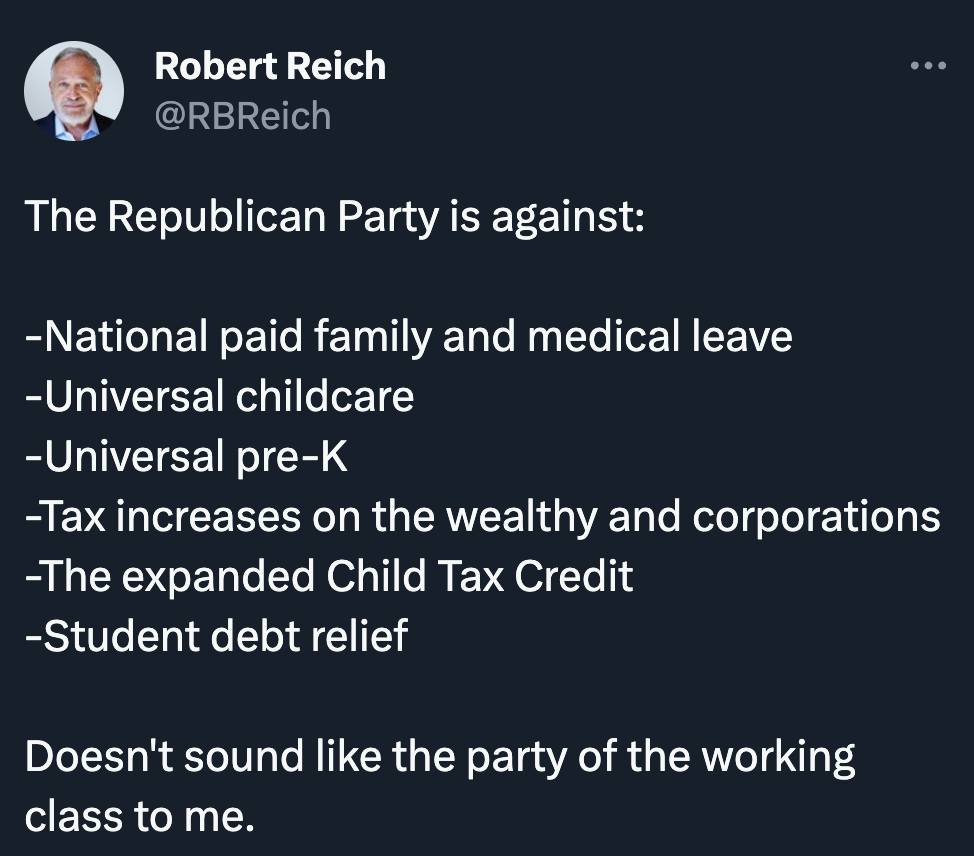this post was submitted on 27 Aug 2023
1757 points (96.7% liked)
Political Memes
8636 readers
3528 users here now
Welcome to politcal memes!
These are our rules:
Be civil
Jokes are okay, but don’t intentionally harass or disturb any member of our community. Sexism, racism and bigotry are not allowed. Good faith argumentation only. No posts discouraging people to vote or shaming people for voting.
No misinformation
Don’t post any intentional misinformation. When asked by mods, provide sources for any claims you make.
Posts should be memes
Random pictures do not qualify as memes. Relevance to politics is required.
No bots, spam or self-promotion
Follow instance rules, ask for your bot to be allowed on this community.
No AI generated content.
Content posted must not be created by AI with the intent to mimic the style of existing images
founded 2 years ago
MODERATORS
you are viewing a single comment's thread
view the rest of the comments
view the rest of the comments

Roughly 50% more people go to college now than in the 50s and 60s: https://educationdata.org/college-enrollment-statistics#college-enrollment-statistics
That's why college is more expensive now. It used to be something you paid for to go, and now there are loans. This drove up demand and changed the financial incentive structure. It's the #1 reason why I believe college should be free for the lower three quintiles.
Pensions are a crap idea and always were. Today my wife and I are straight up cashing in her pension because it's worth more in an IRA.
Share buybacks are good for companies, workers, and the market in general - which protects 401(k)s as well. Not sure why that's an issue for you?
Unions are expanding again and I hope that really takes off.
I definitely do not see how the New Deal was "dismantled" or that the Democrat party of today had anything to do with it. The New Deals/Great Society were a defining time for conservatives and many conservative Democrats left the party over it.
https://en.m.wikipedia.org/wiki/New_Deal#:~:text=The%20Second%20New%20Deal%20in,tenant%20farmers%20and%20migrant%20workers.
Back then, states funded their colleges- tuition wasn't the primary funding mechanism. But, shortly after desegregation, that funding started to dry up now that brown people could benefit and the politics of keeping college cheap became fraught (and educating a multiracial egalitarian society became 'communism', which nicely dovetailed with the red scares of the time).
Then, as prices went up, loans became a thing- but loans were routinely discriminatory on things like race, gender, etc. So, when they made loans less discriminatory and easier to get, that's when your answer became accurate: we all watched an army of MBAs swoop in and become middle-management of universities that transformed themselves to capture a share of all that available money.
Yeah, college got expensive because loans got easy to get- but the reason for loans in the first place was in large part that the right wanted to gatekeep education because they saw an educated public as a threat.
Then you're not looking. Glass-Steagall? Repealed under Clinton. Enforceable financial regulations? Deregulated quietly on a bipartisan basis since the 90s. Labor relations? Unions have been gutted and wage protections neglected, so much so that it became difficult to form unions. Antitrust? When the Democrats swept congress after Nixon, they retired the Democrats' expertise on antitrust enforcement. The then-new dem leadership became fascinated with pivoting towards the center, such that the Democrats stopped representing labor and became the party of professionals. With 0 parties representing the working class and both parties engaged in the project of deregulation and privatizing public goods and services, several major parts of the New Deal were quietly neglected or just not enforced.
Today, banking is to a much greater extent regulated by private consortiums composed of... yes, bankers than it was then. The same fox that guarded the henhouse prior to the Great Depression was put in charge, and it wasn't long before we had another depression-scale collapse.
As of the early 1970s, the robust trust-busting of the 1930s onward was quietly discontinued; the 'watergate-baby dems' (who were elected in the wake of Watergate) weren't excited about monopoly enforcement. On their watch, enforcement was largely defunded. Non-enforcement of The Packers and Stockyards act eventually led to today's state of affairs, in which there are just 4 conglomerates in the market between farm and grocer. This pattern isn't limited to the meat industry, it is happening everywhere- middlemen control supply chains, 'vertical integration' and mergers and acquisitions mean producers are squeezed. That's just plain down on the neoliberals getting hold of the Democratic party and letting corporations reassert dominance.
If by that you mean conservatives hated everything about it and called it communism and conducted non-stop red-scares and moral panics to fight it, I suppose you're right. That bit where conservative dems left the party- yeah, that coincided with the democrats' embrace of the civil rights movement too, and that party realignment broadly energized the American right under the GOP banner (where before that, both parties had conservative and progressive wings)
Jesus you people are fucking exhausting the way you write like you're trying out for Last Week Tonight.
Just speak like a person. I would've been interested in this discussion. We'd have politely disagreed on a couple things, I'd have fixed some of your bad history, and it would've been fun
If you're gonna keep writing all jackassy at least try to be funnier.